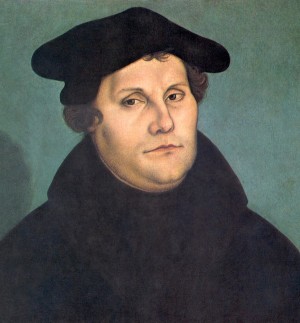 We saw that Martin Luther began his rediscovery of the Gospel during his lectures on Romans in 1515-16 (Cause of Salvation). Although Dr. Luther became famous because of the publication of the Ninety-Five Theses in November 1517, his scholarly activities since 1514 had led him to refine his understanding of theology already. After completing his lectures on Romans, Luther lectured on Galatians and Hebrews. However, in September 1517 Dr. Luther had already published the “manifesto of the new reform movement.” [Andrew Pettegree, Brand Luther (New York 2015), 51.] This document contained a series of theses against medieval scholastic theology.
We saw that Martin Luther began his rediscovery of the Gospel during his lectures on Romans in 1515-16 (Cause of Salvation). Although Dr. Luther became famous because of the publication of the Ninety-Five Theses in November 1517, his scholarly activities since 1514 had led him to refine his understanding of theology already. After completing his lectures on Romans, Luther lectured on Galatians and Hebrews. However, in September 1517 Dr. Luther had already published the “manifesto of the new reform movement.” [Andrew Pettegree, Brand Luther (New York 2015), 51.] This document contained a series of theses against medieval scholastic theology.
In the theses Dr. Luther demonstrated his new concentration on the Bible and the writings of Augustine of Hippo. This publication represented a definitive, public refutation of the late medieval scholastic theologians’ emphasis on the ability of human free will to seek God and act lovingly toward Him. He rejected the idea that sinners could prepare themselves to receive God’s grace through any actions. In fact, because of sin, fallen humans have no desire for God or his precepts. The Law exposes evil attitudes and coerces toward certain outward action, but only God’s grace justifies and changes the sinful will. [Martin Luther, Disputation Against Scholastic Theology, Luther’s Works, vol. 31, 9-16.]
Luther clearly rejected the integration of Aristotle’s philosophy with Christian theological concepts of grace, justification, and good works. Dr. Luther argued specifically against the application of Aristotle’s ethical teaching to theology. Aristotle taught that humans become more just by practicing justice. Scholastic theologians integrated this idea with Christian theology through teaching that God created a habit of love in the believer’s soul by which the Christian could exercise his will and perform good works to make himself righteous. Luther explicitly rejected this notion when he wrote, “We do not become righteous by doing righteous deeds, but, having been made righteous, we do righteous deeds.” [Luther, Disputation, Thesis 40, LW 31:12.]